Entrepreneurship Report: Ventures, Impact, and Entrepreneurial Aspects
VerifiedAdded on 2020/06/04
|17
|4722
|35
Report
AI Summary
This report provides a comprehensive overview of entrepreneurship, defining it as the process of starting new businesses with the goal of profit and risk-taking. It explores various types of entrepreneurial ventures, including serial, social, and female entrepreneurs, and examines their relationship with different typologies such as lifestyle, survival, and managed growth ventures. The report assesses the impact of micro and small businesses on the economy, highlighting their role in generating employment and contributing to social well-being. It further delves into the characteristics, traits, and skills of successful entrepreneurs, analyzing aspects of entrepreneurial personality and the factors that either foster or hinder entrepreneurship. The report emphasizes the importance of innovation, risk-taking, and strategic planning in achieving entrepreneurial success and contributing to economic growth.

Entrepreneurship
Paraphrase This Document
Need a fresh take? Get an instant paraphrase of this document with our AI Paraphraser
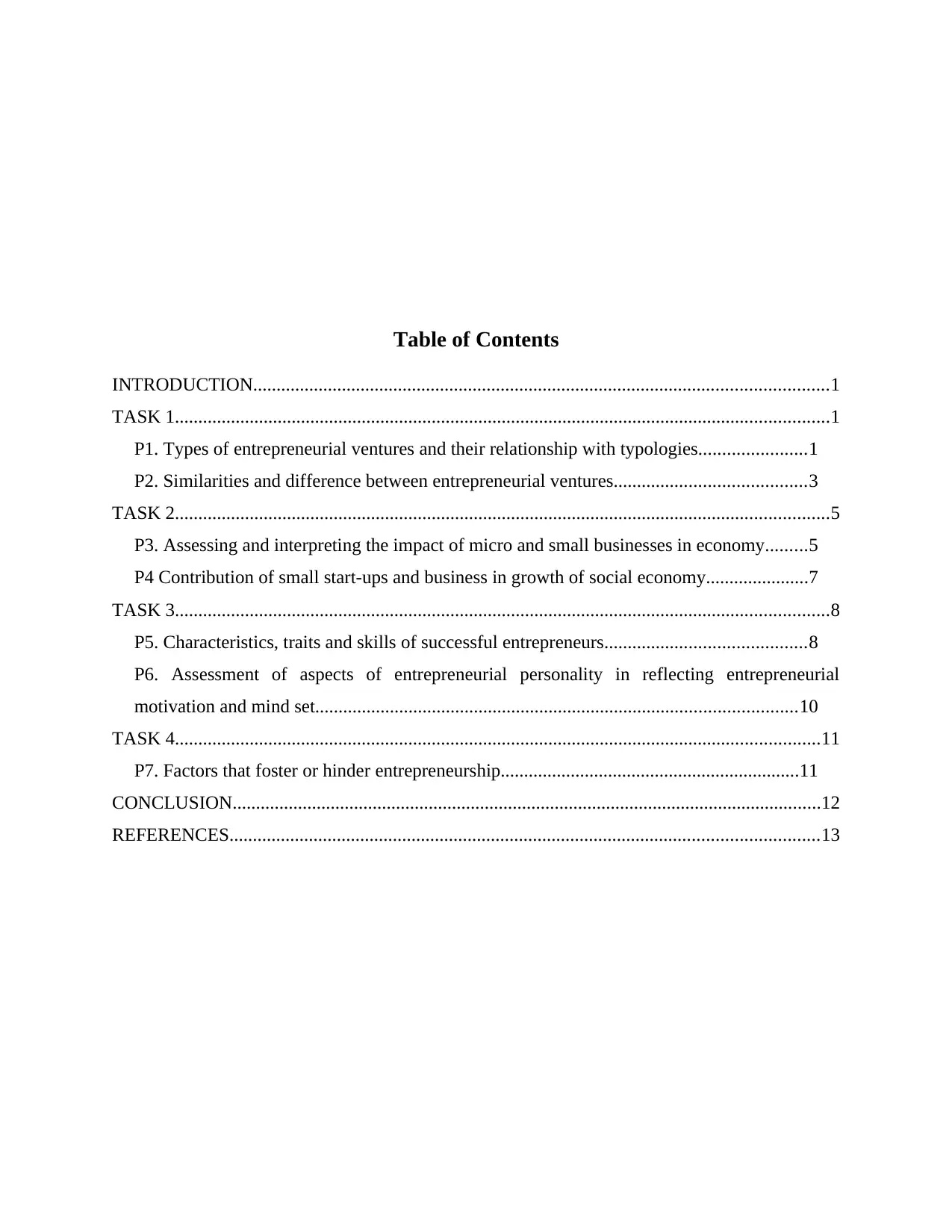
Table of Contents
INTRODUCTION...........................................................................................................................1
TASK 1............................................................................................................................................1
P1. Types of entrepreneurial ventures and their relationship with typologies.......................1
P2. Similarities and difference between entrepreneurial ventures.........................................3
TASK 2............................................................................................................................................5
P3. Assessing and interpreting the impact of micro and small businesses in economy.........5
P4 Contribution of small start-ups and business in growth of social economy......................7
TASK 3............................................................................................................................................8
P5. Characteristics, traits and skills of successful entrepreneurs...........................................8
P6. Assessment of aspects of entrepreneurial personality in reflecting entrepreneurial
motivation and mind set.......................................................................................................10
TASK 4..........................................................................................................................................11
P7. Factors that foster or hinder entrepreneurship................................................................11
CONCLUSION..............................................................................................................................12
REFERENCES..............................................................................................................................13
INTRODUCTION...........................................................................................................................1
TASK 1............................................................................................................................................1
P1. Types of entrepreneurial ventures and their relationship with typologies.......................1
P2. Similarities and difference between entrepreneurial ventures.........................................3
TASK 2............................................................................................................................................5
P3. Assessing and interpreting the impact of micro and small businesses in economy.........5
P4 Contribution of small start-ups and business in growth of social economy......................7
TASK 3............................................................................................................................................8
P5. Characteristics, traits and skills of successful entrepreneurs...........................................8
P6. Assessment of aspects of entrepreneurial personality in reflecting entrepreneurial
motivation and mind set.......................................................................................................10
TASK 4..........................................................................................................................................11
P7. Factors that foster or hinder entrepreneurship................................................................11
CONCLUSION..............................................................................................................................12
REFERENCES..............................................................................................................................13

⊘ This is a preview!⊘
Do you want full access?
Subscribe today to unlock all pages.

Trusted by 1+ million students worldwide
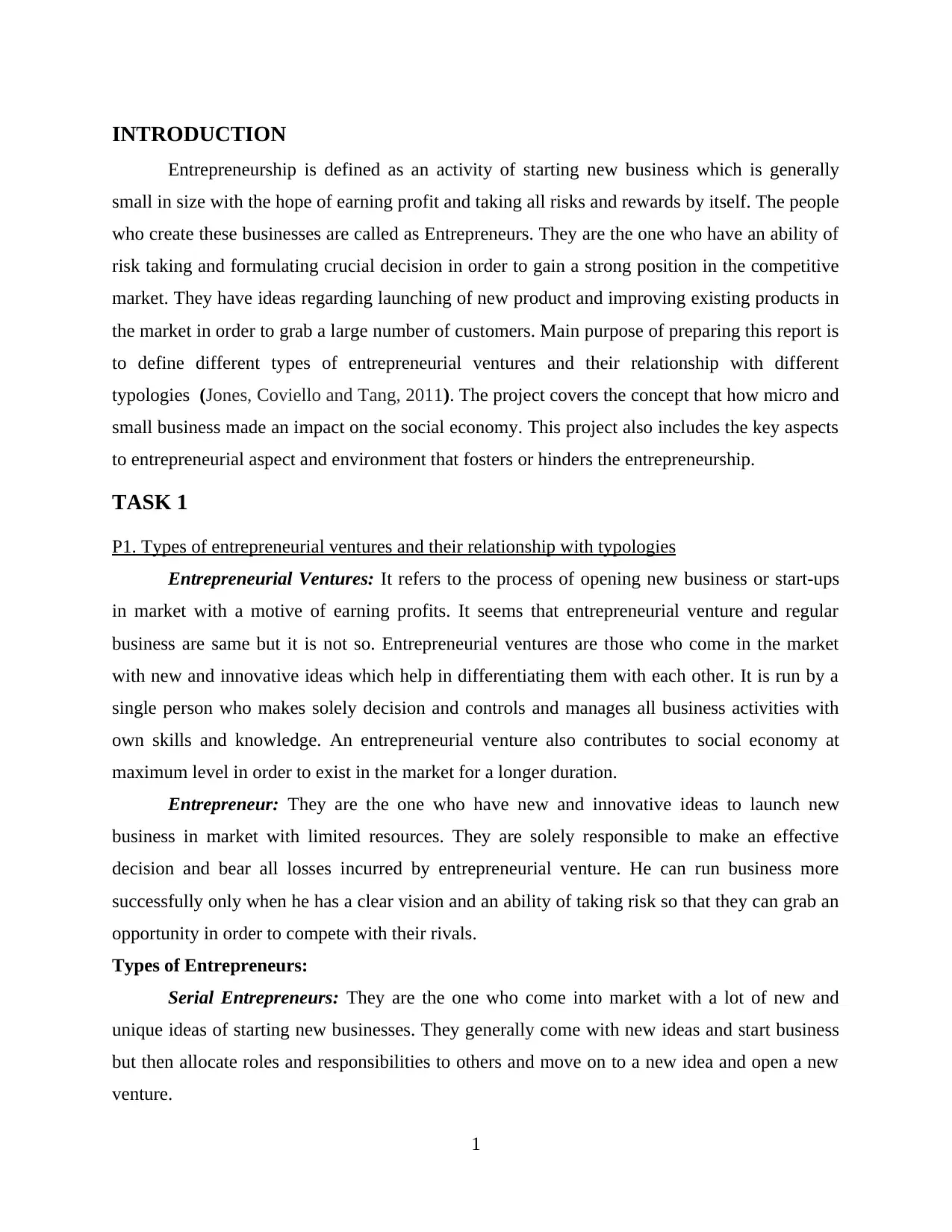
INTRODUCTION
Entrepreneurship is defined as an activity of starting new business which is generally
small in size with the hope of earning profit and taking all risks and rewards by itself. The people
who create these businesses are called as Entrepreneurs. They are the one who have an ability of
risk taking and formulating crucial decision in order to gain a strong position in the competitive
market. They have ideas regarding launching of new product and improving existing products in
the market in order to grab a large number of customers. Main purpose of preparing this report is
to define different types of entrepreneurial ventures and their relationship with different
typologies (Jones, Coviello and Tang, 2011). The project covers the concept that how micro and
small business made an impact on the social economy. This project also includes the key aspects
to entrepreneurial aspect and environment that fosters or hinders the entrepreneurship.
TASK 1
P1. Types of entrepreneurial ventures and their relationship with typologies
Entrepreneurial Ventures: It refers to the process of opening new business or start-ups
in market with a motive of earning profits. It seems that entrepreneurial venture and regular
business are same but it is not so. Entrepreneurial ventures are those who come in the market
with new and innovative ideas which help in differentiating them with each other. It is run by a
single person who makes solely decision and controls and manages all business activities with
own skills and knowledge. An entrepreneurial venture also contributes to social economy at
maximum level in order to exist in the market for a longer duration.
Entrepreneur: They are the one who have new and innovative ideas to launch new
business in market with limited resources. They are solely responsible to make an effective
decision and bear all losses incurred by entrepreneurial venture. He can run business more
successfully only when he has a clear vision and an ability of taking risk so that they can grab an
opportunity in order to compete with their rivals.
Types of Entrepreneurs:
Serial Entrepreneurs: They are the one who come into market with a lot of new and
unique ideas of starting new businesses. They generally come with new ideas and start business
but then allocate roles and responsibilities to others and move on to a new idea and open a new
venture.
1
Entrepreneurship is defined as an activity of starting new business which is generally
small in size with the hope of earning profit and taking all risks and rewards by itself. The people
who create these businesses are called as Entrepreneurs. They are the one who have an ability of
risk taking and formulating crucial decision in order to gain a strong position in the competitive
market. They have ideas regarding launching of new product and improving existing products in
the market in order to grab a large number of customers. Main purpose of preparing this report is
to define different types of entrepreneurial ventures and their relationship with different
typologies (Jones, Coviello and Tang, 2011). The project covers the concept that how micro and
small business made an impact on the social economy. This project also includes the key aspects
to entrepreneurial aspect and environment that fosters or hinders the entrepreneurship.
TASK 1
P1. Types of entrepreneurial ventures and their relationship with typologies
Entrepreneurial Ventures: It refers to the process of opening new business or start-ups
in market with a motive of earning profits. It seems that entrepreneurial venture and regular
business are same but it is not so. Entrepreneurial ventures are those who come in the market
with new and innovative ideas which help in differentiating them with each other. It is run by a
single person who makes solely decision and controls and manages all business activities with
own skills and knowledge. An entrepreneurial venture also contributes to social economy at
maximum level in order to exist in the market for a longer duration.
Entrepreneur: They are the one who have new and innovative ideas to launch new
business in market with limited resources. They are solely responsible to make an effective
decision and bear all losses incurred by entrepreneurial venture. He can run business more
successfully only when he has a clear vision and an ability of taking risk so that they can grab an
opportunity in order to compete with their rivals.
Types of Entrepreneurs:
Serial Entrepreneurs: They are the one who come into market with a lot of new and
unique ideas of starting new businesses. They generally come with new ideas and start business
but then allocate roles and responsibilities to others and move on to a new idea and open a new
venture.
1
Paraphrase This Document
Need a fresh take? Get an instant paraphrase of this document with our AI Paraphraser
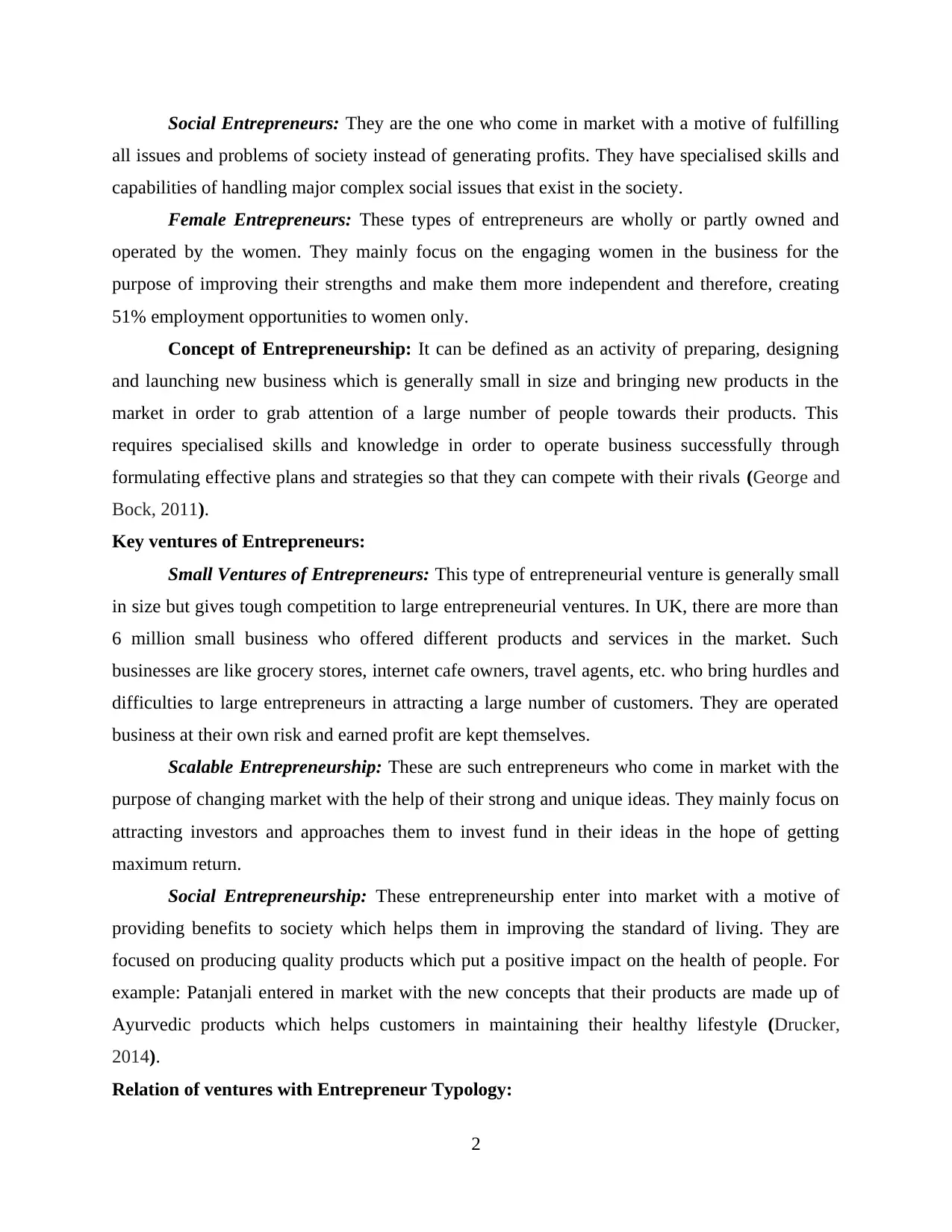
Social Entrepreneurs: They are the one who come in market with a motive of fulfilling
all issues and problems of society instead of generating profits. They have specialised skills and
capabilities of handling major complex social issues that exist in the society.
Female Entrepreneurs: These types of entrepreneurs are wholly or partly owned and
operated by the women. They mainly focus on the engaging women in the business for the
purpose of improving their strengths and make them more independent and therefore, creating
51% employment opportunities to women only.
Concept of Entrepreneurship: It can be defined as an activity of preparing, designing
and launching new business which is generally small in size and bringing new products in the
market in order to grab attention of a large number of people towards their products. This
requires specialised skills and knowledge in order to operate business successfully through
formulating effective plans and strategies so that they can compete with their rivals (George and
Bock, 2011).
Key ventures of Entrepreneurs:
Small Ventures of Entrepreneurs: This type of entrepreneurial venture is generally small
in size but gives tough competition to large entrepreneurial ventures. In UK, there are more than
6 million small business who offered different products and services in the market. Such
businesses are like grocery stores, internet cafe owners, travel agents, etc. who bring hurdles and
difficulties to large entrepreneurs in attracting a large number of customers. They are operated
business at their own risk and earned profit are kept themselves.
Scalable Entrepreneurship: These are such entrepreneurs who come in market with the
purpose of changing market with the help of their strong and unique ideas. They mainly focus on
attracting investors and approaches them to invest fund in their ideas in the hope of getting
maximum return.
Social Entrepreneurship: These entrepreneurship enter into market with a motive of
providing benefits to society which helps them in improving the standard of living. They are
focused on producing quality products which put a positive impact on the health of people. For
example: Patanjali entered in market with the new concepts that their products are made up of
Ayurvedic products which helps customers in maintaining their healthy lifestyle (Drucker,
2014).
Relation of ventures with Entrepreneur Typology:
2
all issues and problems of society instead of generating profits. They have specialised skills and
capabilities of handling major complex social issues that exist in the society.
Female Entrepreneurs: These types of entrepreneurs are wholly or partly owned and
operated by the women. They mainly focus on the engaging women in the business for the
purpose of improving their strengths and make them more independent and therefore, creating
51% employment opportunities to women only.
Concept of Entrepreneurship: It can be defined as an activity of preparing, designing
and launching new business which is generally small in size and bringing new products in the
market in order to grab attention of a large number of people towards their products. This
requires specialised skills and knowledge in order to operate business successfully through
formulating effective plans and strategies so that they can compete with their rivals (George and
Bock, 2011).
Key ventures of Entrepreneurs:
Small Ventures of Entrepreneurs: This type of entrepreneurial venture is generally small
in size but gives tough competition to large entrepreneurial ventures. In UK, there are more than
6 million small business who offered different products and services in the market. Such
businesses are like grocery stores, internet cafe owners, travel agents, etc. who bring hurdles and
difficulties to large entrepreneurs in attracting a large number of customers. They are operated
business at their own risk and earned profit are kept themselves.
Scalable Entrepreneurship: These are such entrepreneurs who come in market with the
purpose of changing market with the help of their strong and unique ideas. They mainly focus on
attracting investors and approaches them to invest fund in their ideas in the hope of getting
maximum return.
Social Entrepreneurship: These entrepreneurship enter into market with a motive of
providing benefits to society which helps them in improving the standard of living. They are
focused on producing quality products which put a positive impact on the health of people. For
example: Patanjali entered in market with the new concepts that their products are made up of
Ayurvedic products which helps customers in maintaining their healthy lifestyle (Drucker,
2014).
Relation of ventures with Entrepreneur Typology:
2
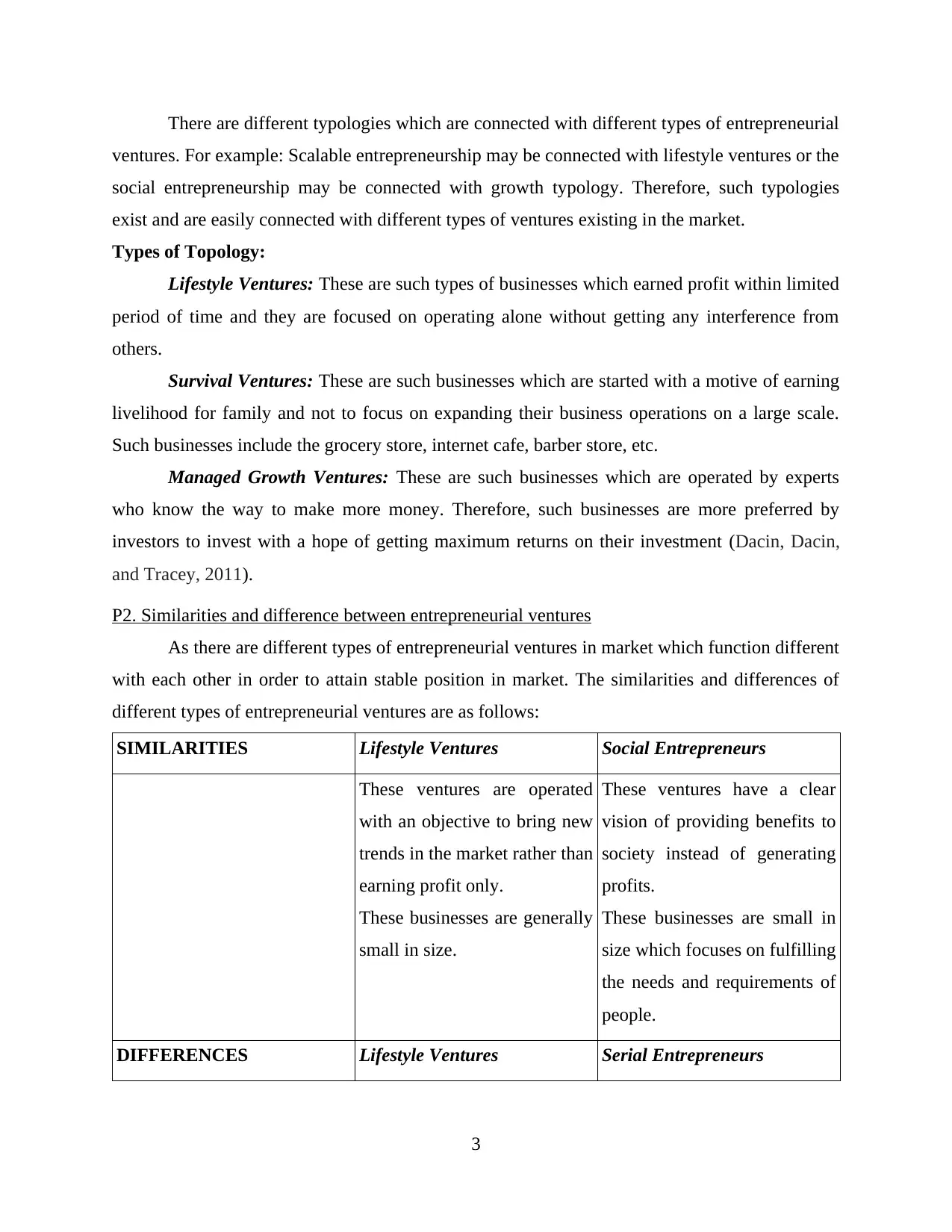
There are different typologies which are connected with different types of entrepreneurial
ventures. For example: Scalable entrepreneurship may be connected with lifestyle ventures or the
social entrepreneurship may be connected with growth typology. Therefore, such typologies
exist and are easily connected with different types of ventures existing in the market.
Types of Topology:
Lifestyle Ventures: These are such types of businesses which earned profit within limited
period of time and they are focused on operating alone without getting any interference from
others.
Survival Ventures: These are such businesses which are started with a motive of earning
livelihood for family and not to focus on expanding their business operations on a large scale.
Such businesses include the grocery store, internet cafe, barber store, etc.
Managed Growth Ventures: These are such businesses which are operated by experts
who know the way to make more money. Therefore, such businesses are more preferred by
investors to invest with a hope of getting maximum returns on their investment (Dacin, Dacin,
and Tracey, 2011).
P2. Similarities and difference between entrepreneurial ventures
As there are different types of entrepreneurial ventures in market which function different
with each other in order to attain stable position in market. The similarities and differences of
different types of entrepreneurial ventures are as follows:
SIMILARITIES Lifestyle Ventures Social Entrepreneurs
These ventures are operated
with an objective to bring new
trends in the market rather than
earning profit only.
These businesses are generally
small in size.
These ventures have a clear
vision of providing benefits to
society instead of generating
profits.
These businesses are small in
size which focuses on fulfilling
the needs and requirements of
people.
DIFFERENCES Lifestyle Ventures Serial Entrepreneurs
3
ventures. For example: Scalable entrepreneurship may be connected with lifestyle ventures or the
social entrepreneurship may be connected with growth typology. Therefore, such typologies
exist and are easily connected with different types of ventures existing in the market.
Types of Topology:
Lifestyle Ventures: These are such types of businesses which earned profit within limited
period of time and they are focused on operating alone without getting any interference from
others.
Survival Ventures: These are such businesses which are started with a motive of earning
livelihood for family and not to focus on expanding their business operations on a large scale.
Such businesses include the grocery store, internet cafe, barber store, etc.
Managed Growth Ventures: These are such businesses which are operated by experts
who know the way to make more money. Therefore, such businesses are more preferred by
investors to invest with a hope of getting maximum returns on their investment (Dacin, Dacin,
and Tracey, 2011).
P2. Similarities and difference between entrepreneurial ventures
As there are different types of entrepreneurial ventures in market which function different
with each other in order to attain stable position in market. The similarities and differences of
different types of entrepreneurial ventures are as follows:
SIMILARITIES Lifestyle Ventures Social Entrepreneurs
These ventures are operated
with an objective to bring new
trends in the market rather than
earning profit only.
These businesses are generally
small in size.
These ventures have a clear
vision of providing benefits to
society instead of generating
profits.
These businesses are small in
size which focuses on fulfilling
the needs and requirements of
people.
DIFFERENCES Lifestyle Ventures Serial Entrepreneurs
3
⊘ This is a preview!⊘
Do you want full access?
Subscribe today to unlock all pages.

Trusted by 1+ million students worldwide
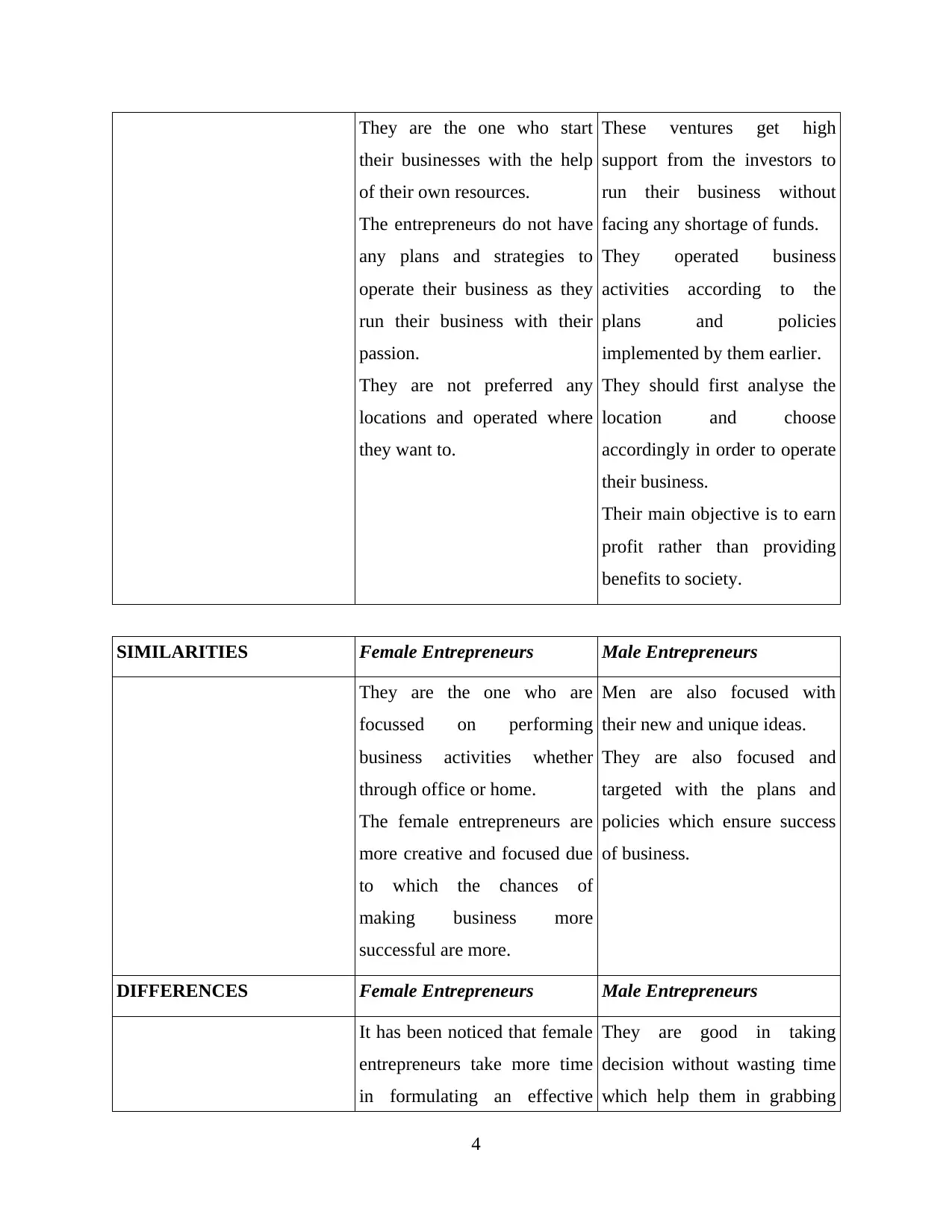
They are the one who start
their businesses with the help
of their own resources.
The entrepreneurs do not have
any plans and strategies to
operate their business as they
run their business with their
passion.
They are not preferred any
locations and operated where
they want to.
These ventures get high
support from the investors to
run their business without
facing any shortage of funds.
They operated business
activities according to the
plans and policies
implemented by them earlier.
They should first analyse the
location and choose
accordingly in order to operate
their business.
Their main objective is to earn
profit rather than providing
benefits to society.
SIMILARITIES Female Entrepreneurs Male Entrepreneurs
They are the one who are
focussed on performing
business activities whether
through office or home.
The female entrepreneurs are
more creative and focused due
to which the chances of
making business more
successful are more.
Men are also focused with
their new and unique ideas.
They are also focused and
targeted with the plans and
policies which ensure success
of business.
DIFFERENCES Female Entrepreneurs Male Entrepreneurs
It has been noticed that female
entrepreneurs take more time
in formulating an effective
They are good in taking
decision without wasting time
which help them in grabbing
4
their businesses with the help
of their own resources.
The entrepreneurs do not have
any plans and strategies to
operate their business as they
run their business with their
passion.
They are not preferred any
locations and operated where
they want to.
These ventures get high
support from the investors to
run their business without
facing any shortage of funds.
They operated business
activities according to the
plans and policies
implemented by them earlier.
They should first analyse the
location and choose
accordingly in order to operate
their business.
Their main objective is to earn
profit rather than providing
benefits to society.
SIMILARITIES Female Entrepreneurs Male Entrepreneurs
They are the one who are
focussed on performing
business activities whether
through office or home.
The female entrepreneurs are
more creative and focused due
to which the chances of
making business more
successful are more.
Men are also focused with
their new and unique ideas.
They are also focused and
targeted with the plans and
policies which ensure success
of business.
DIFFERENCES Female Entrepreneurs Male Entrepreneurs
It has been noticed that female
entrepreneurs take more time
in formulating an effective
They are good in taking
decision without wasting time
which help them in grabbing
4
Paraphrase This Document
Need a fresh take? Get an instant paraphrase of this document with our AI Paraphraser
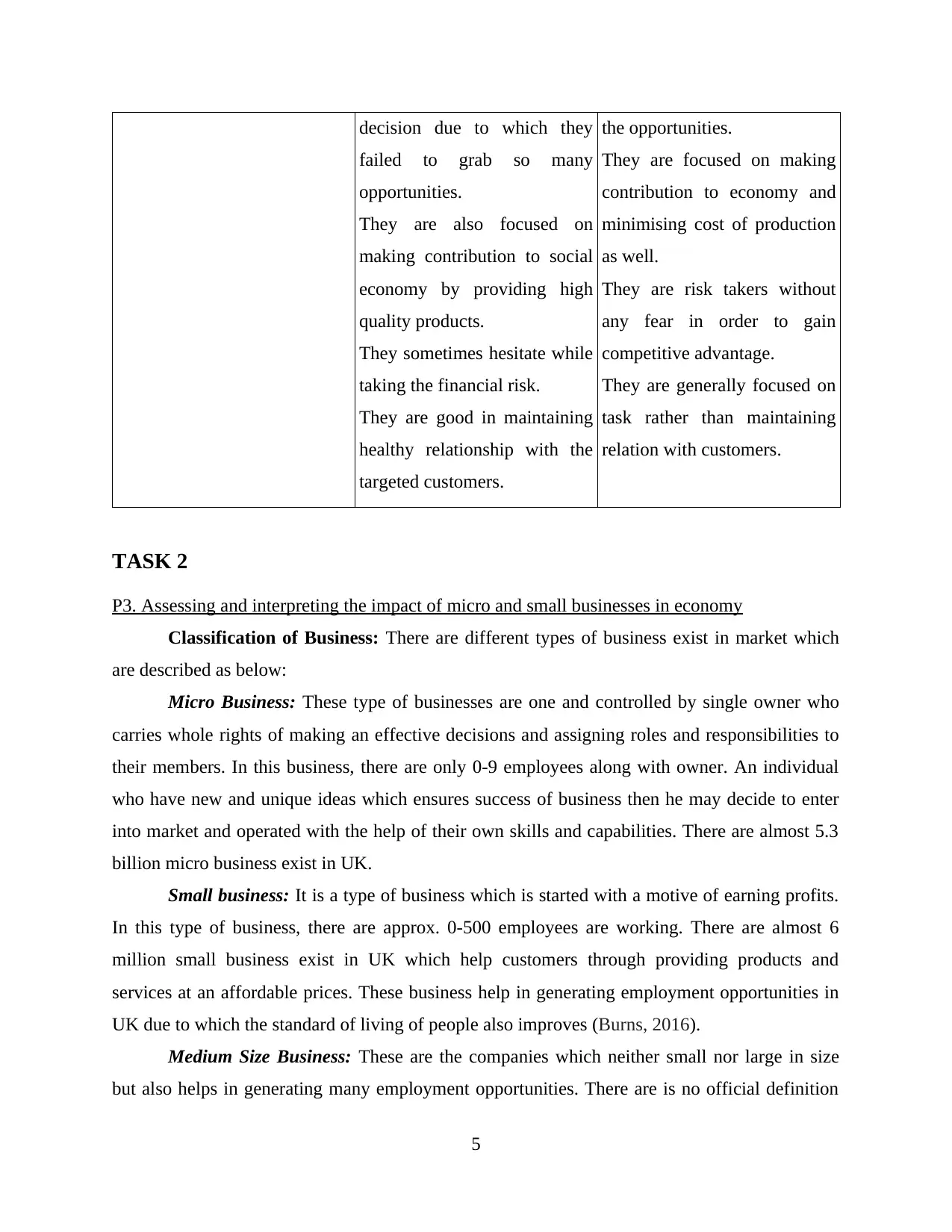
decision due to which they
failed to grab so many
opportunities.
They are also focused on
making contribution to social
economy by providing high
quality products.
They sometimes hesitate while
taking the financial risk.
They are good in maintaining
healthy relationship with the
targeted customers.
the opportunities.
They are focused on making
contribution to economy and
minimising cost of production
as well.
They are risk takers without
any fear in order to gain
competitive advantage.
They are generally focused on
task rather than maintaining
relation with customers.
TASK 2
P3. Assessing and interpreting the impact of micro and small businesses in economy
Classification of Business: There are different types of business exist in market which
are described as below:
Micro Business: These type of businesses are one and controlled by single owner who
carries whole rights of making an effective decisions and assigning roles and responsibilities to
their members. In this business, there are only 0-9 employees along with owner. An individual
who have new and unique ideas which ensures success of business then he may decide to enter
into market and operated with the help of their own skills and capabilities. There are almost 5.3
billion micro business exist in UK.
Small business: It is a type of business which is started with a motive of earning profits.
In this type of business, there are approx. 0-500 employees are working. There are almost 6
million small business exist in UK which help customers through providing products and
services at an affordable prices. These business help in generating employment opportunities in
UK due to which the standard of living of people also improves (Burns, 2016).
Medium Size Business: These are the companies which neither small nor large in size
but also helps in generating many employment opportunities. There are is no official definition
5
failed to grab so many
opportunities.
They are also focused on
making contribution to social
economy by providing high
quality products.
They sometimes hesitate while
taking the financial risk.
They are good in maintaining
healthy relationship with the
targeted customers.
the opportunities.
They are focused on making
contribution to economy and
minimising cost of production
as well.
They are risk takers without
any fear in order to gain
competitive advantage.
They are generally focused on
task rather than maintaining
relation with customers.
TASK 2
P3. Assessing and interpreting the impact of micro and small businesses in economy
Classification of Business: There are different types of business exist in market which
are described as below:
Micro Business: These type of businesses are one and controlled by single owner who
carries whole rights of making an effective decisions and assigning roles and responsibilities to
their members. In this business, there are only 0-9 employees along with owner. An individual
who have new and unique ideas which ensures success of business then he may decide to enter
into market and operated with the help of their own skills and capabilities. There are almost 5.3
billion micro business exist in UK.
Small business: It is a type of business which is started with a motive of earning profits.
In this type of business, there are approx. 0-500 employees are working. There are almost 6
million small business exist in UK which help customers through providing products and
services at an affordable prices. These business help in generating employment opportunities in
UK due to which the standard of living of people also improves (Burns, 2016).
Medium Size Business: These are the companies which neither small nor large in size
but also helps in generating many employment opportunities. There are is no official definition
5
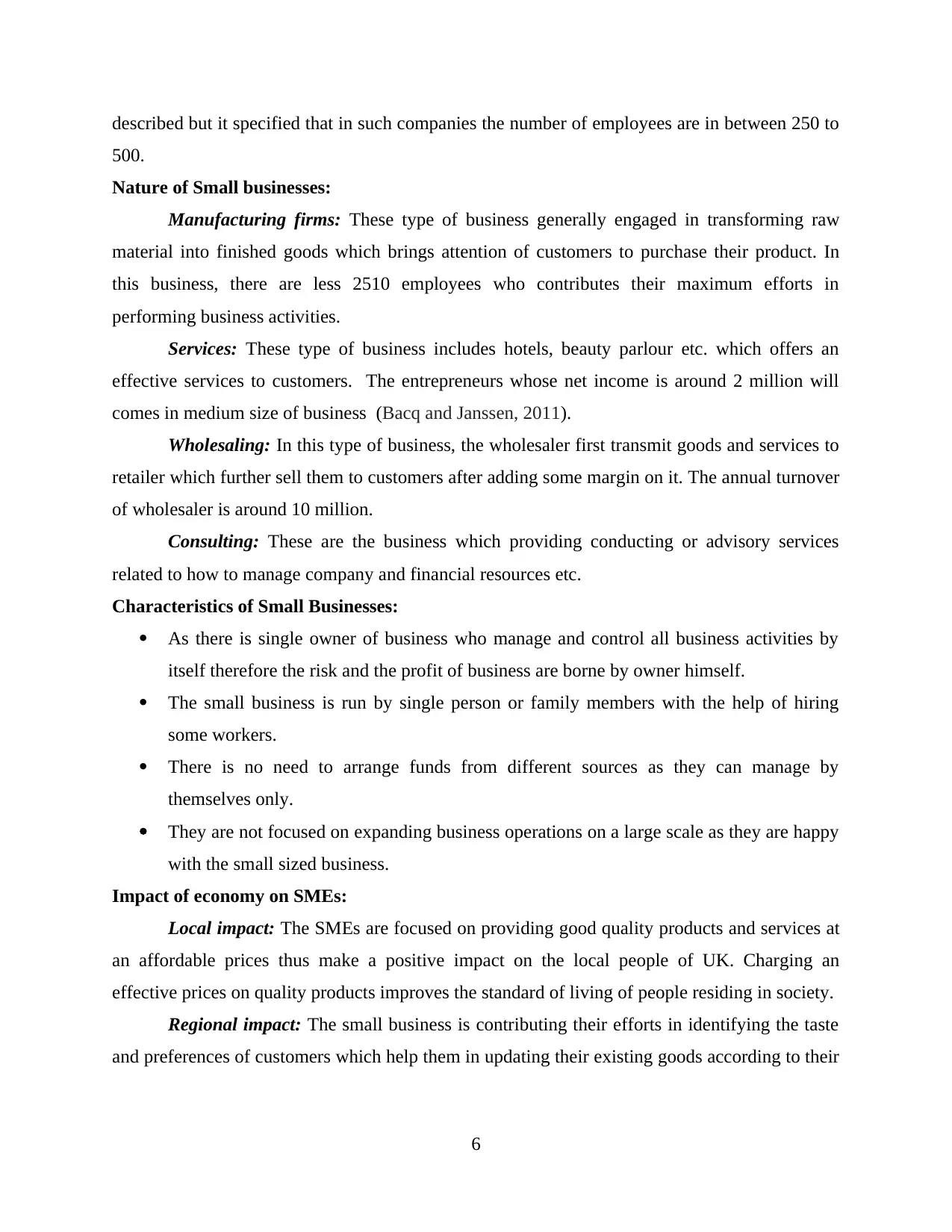
described but it specified that in such companies the number of employees are in between 250 to
500.
Nature of Small businesses:
Manufacturing firms: These type of business generally engaged in transforming raw
material into finished goods which brings attention of customers to purchase their product. In
this business, there are less 2510 employees who contributes their maximum efforts in
performing business activities.
Services: These type of business includes hotels, beauty parlour etc. which offers an
effective services to customers. The entrepreneurs whose net income is around 2 million will
comes in medium size of business (Bacq and Janssen, 2011).
Wholesaling: In this type of business, the wholesaler first transmit goods and services to
retailer which further sell them to customers after adding some margin on it. The annual turnover
of wholesaler is around 10 million.
Consulting: These are the business which providing conducting or advisory services
related to how to manage company and financial resources etc.
Characteristics of Small Businesses:
As there is single owner of business who manage and control all business activities by
itself therefore the risk and the profit of business are borne by owner himself.
The small business is run by single person or family members with the help of hiring
some workers.
There is no need to arrange funds from different sources as they can manage by
themselves only.
They are not focused on expanding business operations on a large scale as they are happy
with the small sized business.
Impact of economy on SMEs:
Local impact: The SMEs are focused on providing good quality products and services at
an affordable prices thus make a positive impact on the local people of UK. Charging an
effective prices on quality products improves the standard of living of people residing in society.
Regional impact: The small business is contributing their efforts in identifying the taste
and preferences of customers which help them in updating their existing goods according to their
6
500.
Nature of Small businesses:
Manufacturing firms: These type of business generally engaged in transforming raw
material into finished goods which brings attention of customers to purchase their product. In
this business, there are less 2510 employees who contributes their maximum efforts in
performing business activities.
Services: These type of business includes hotels, beauty parlour etc. which offers an
effective services to customers. The entrepreneurs whose net income is around 2 million will
comes in medium size of business (Bacq and Janssen, 2011).
Wholesaling: In this type of business, the wholesaler first transmit goods and services to
retailer which further sell them to customers after adding some margin on it. The annual turnover
of wholesaler is around 10 million.
Consulting: These are the business which providing conducting or advisory services
related to how to manage company and financial resources etc.
Characteristics of Small Businesses:
As there is single owner of business who manage and control all business activities by
itself therefore the risk and the profit of business are borne by owner himself.
The small business is run by single person or family members with the help of hiring
some workers.
There is no need to arrange funds from different sources as they can manage by
themselves only.
They are not focused on expanding business operations on a large scale as they are happy
with the small sized business.
Impact of economy on SMEs:
Local impact: The SMEs are focused on providing good quality products and services at
an affordable prices thus make a positive impact on the local people of UK. Charging an
effective prices on quality products improves the standard of living of people residing in society.
Regional impact: The small business is contributing their efforts in identifying the taste
and preferences of customers which help them in updating their existing goods according to their
6
⊘ This is a preview!⊘
Do you want full access?
Subscribe today to unlock all pages.

Trusted by 1+ million students worldwide
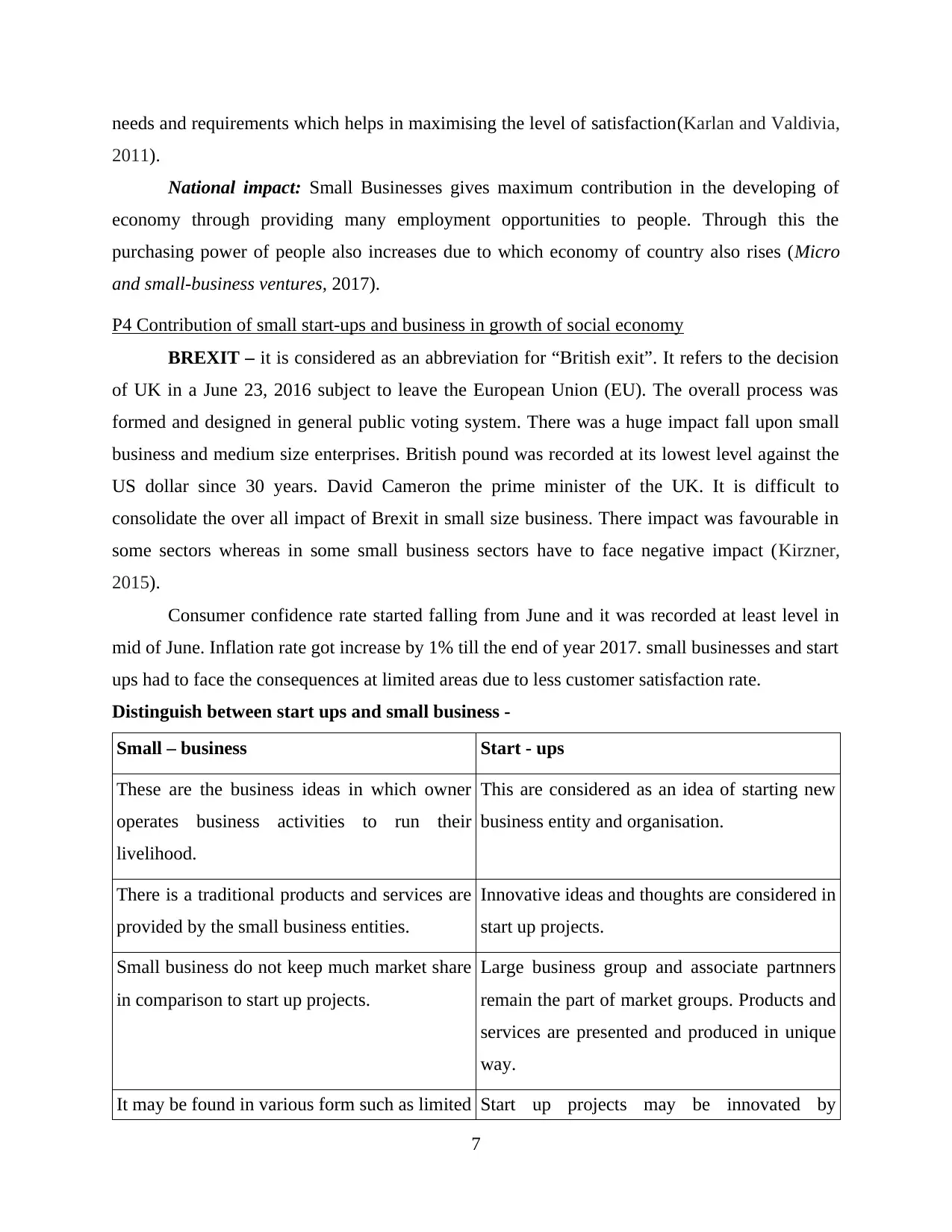
needs and requirements which helps in maximising the level of satisfaction(Karlan and Valdivia,
2011).
National impact: Small Businesses gives maximum contribution in the developing of
economy through providing many employment opportunities to people. Through this the
purchasing power of people also increases due to which economy of country also rises (Micro
and small-business ventures, 2017).
P4 Contribution of small start-ups and business in growth of social economy
BREXIT – it is considered as an abbreviation for “British exit”. It refers to the decision
of UK in a June 23, 2016 subject to leave the European Union (EU). The overall process was
formed and designed in general public voting system. There was a huge impact fall upon small
business and medium size enterprises. British pound was recorded at its lowest level against the
US dollar since 30 years. David Cameron the prime minister of the UK. It is difficult to
consolidate the over all impact of Brexit in small size business. There impact was favourable in
some sectors whereas in some small business sectors have to face negative impact (Kirzner,
2015).
Consumer confidence rate started falling from June and it was recorded at least level in
mid of June. Inflation rate got increase by 1% till the end of year 2017. small businesses and start
ups had to face the consequences at limited areas due to less customer satisfaction rate.
Distinguish between start ups and small business -
Small – business Start - ups
These are the business ideas in which owner
operates business activities to run their
livelihood.
This are considered as an idea of starting new
business entity and organisation.
There is a traditional products and services are
provided by the small business entities.
Innovative ideas and thoughts are considered in
start up projects.
Small business do not keep much market share
in comparison to start up projects.
Large business group and associate partnners
remain the part of market groups. Products and
services are presented and produced in unique
way.
It may be found in various form such as limited Start up projects may be innovated by
7
2011).
National impact: Small Businesses gives maximum contribution in the developing of
economy through providing many employment opportunities to people. Through this the
purchasing power of people also increases due to which economy of country also rises (Micro
and small-business ventures, 2017).
P4 Contribution of small start-ups and business in growth of social economy
BREXIT – it is considered as an abbreviation for “British exit”. It refers to the decision
of UK in a June 23, 2016 subject to leave the European Union (EU). The overall process was
formed and designed in general public voting system. There was a huge impact fall upon small
business and medium size enterprises. British pound was recorded at its lowest level against the
US dollar since 30 years. David Cameron the prime minister of the UK. It is difficult to
consolidate the over all impact of Brexit in small size business. There impact was favourable in
some sectors whereas in some small business sectors have to face negative impact (Kirzner,
2015).
Consumer confidence rate started falling from June and it was recorded at least level in
mid of June. Inflation rate got increase by 1% till the end of year 2017. small businesses and start
ups had to face the consequences at limited areas due to less customer satisfaction rate.
Distinguish between start ups and small business -
Small – business Start - ups
These are the business ideas in which owner
operates business activities to run their
livelihood.
This are considered as an idea of starting new
business entity and organisation.
There is a traditional products and services are
provided by the small business entities.
Innovative ideas and thoughts are considered in
start up projects.
Small business do not keep much market share
in comparison to start up projects.
Large business group and associate partnners
remain the part of market groups. Products and
services are presented and produced in unique
way.
It may be found in various form such as limited Start up projects may be innovated by
7
Paraphrase This Document
Need a fresh take? Get an instant paraphrase of this document with our AI Paraphraser
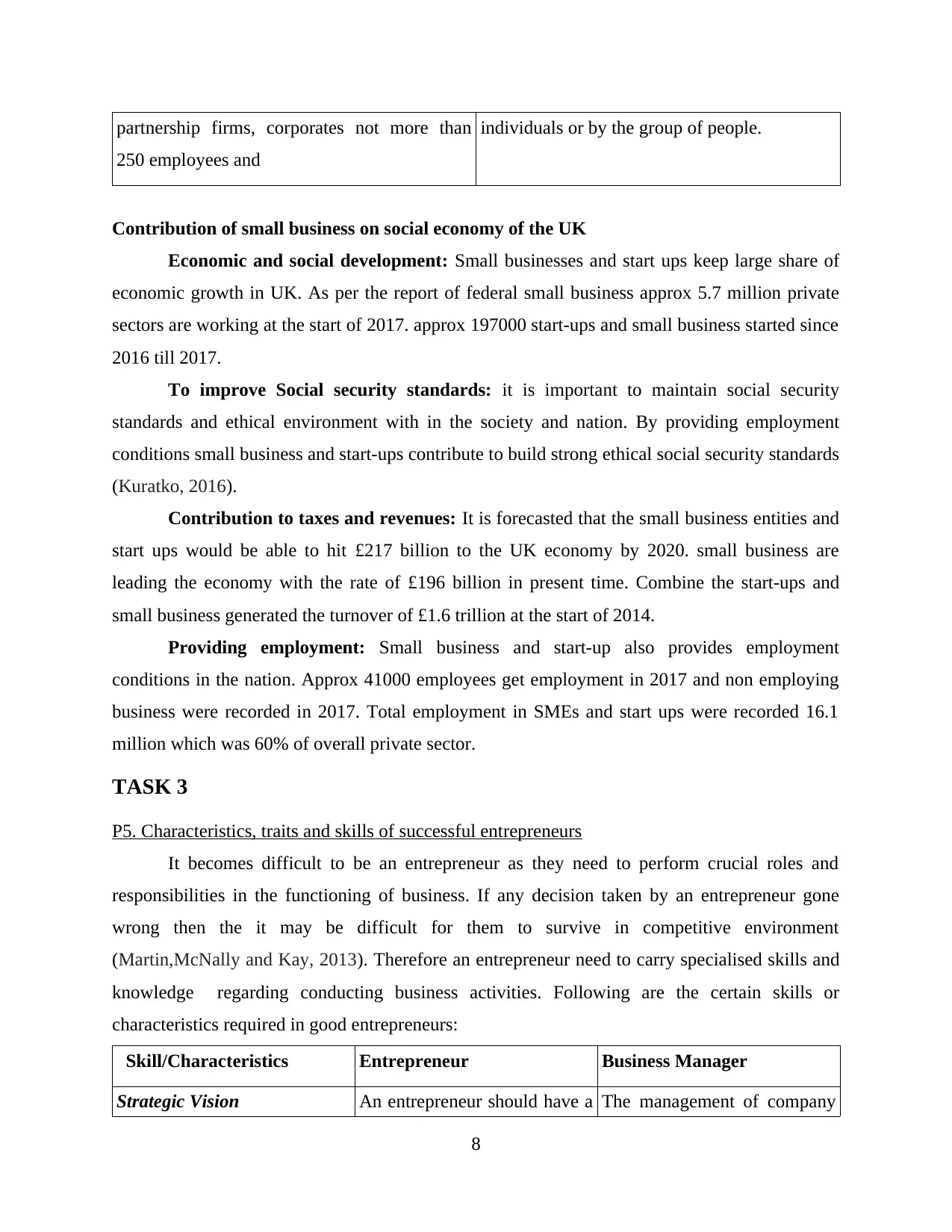
partnership firms, corporates not more than
250 employees and
individuals or by the group of people.
Contribution of small business on social economy of the UK
Economic and social development: Small businesses and start ups keep large share of
economic growth in UK. As per the report of federal small business approx 5.7 million private
sectors are working at the start of 2017. approx 197000 start-ups and small business started since
2016 till 2017.
To improve Social security standards: it is important to maintain social security
standards and ethical environment with in the society and nation. By providing employment
conditions small business and start-ups contribute to build strong ethical social security standards
(Kuratko, 2016).
Contribution to taxes and revenues: It is forecasted that the small business entities and
start ups would be able to hit £217 billion to the UK economy by 2020. small business are
leading the economy with the rate of £196 billion in present time. Combine the start-ups and
small business generated the turnover of £1.6 trillion at the start of 2014.
Providing employment: Small business and start-up also provides employment
conditions in the nation. Approx 41000 employees get employment in 2017 and non employing
business were recorded in 2017. Total employment in SMEs and start ups were recorded 16.1
million which was 60% of overall private sector.
TASK 3
P5. Characteristics, traits and skills of successful entrepreneurs
It becomes difficult to be an entrepreneur as they need to perform crucial roles and
responsibilities in the functioning of business. If any decision taken by an entrepreneur gone
wrong then the it may be difficult for them to survive in competitive environment
(Martin,McNally and Kay, 2013). Therefore an entrepreneur need to carry specialised skills and
knowledge regarding conducting business activities. Following are the certain skills or
characteristics required in good entrepreneurs:
Skill/Characteristics Entrepreneur Business Manager
Strategic Vision An entrepreneur should have a The management of company
8
250 employees and
individuals or by the group of people.
Contribution of small business on social economy of the UK
Economic and social development: Small businesses and start ups keep large share of
economic growth in UK. As per the report of federal small business approx 5.7 million private
sectors are working at the start of 2017. approx 197000 start-ups and small business started since
2016 till 2017.
To improve Social security standards: it is important to maintain social security
standards and ethical environment with in the society and nation. By providing employment
conditions small business and start-ups contribute to build strong ethical social security standards
(Kuratko, 2016).
Contribution to taxes and revenues: It is forecasted that the small business entities and
start ups would be able to hit £217 billion to the UK economy by 2020. small business are
leading the economy with the rate of £196 billion in present time. Combine the start-ups and
small business generated the turnover of £1.6 trillion at the start of 2014.
Providing employment: Small business and start-up also provides employment
conditions in the nation. Approx 41000 employees get employment in 2017 and non employing
business were recorded in 2017. Total employment in SMEs and start ups were recorded 16.1
million which was 60% of overall private sector.
TASK 3
P5. Characteristics, traits and skills of successful entrepreneurs
It becomes difficult to be an entrepreneur as they need to perform crucial roles and
responsibilities in the functioning of business. If any decision taken by an entrepreneur gone
wrong then the it may be difficult for them to survive in competitive environment
(Martin,McNally and Kay, 2013). Therefore an entrepreneur need to carry specialised skills and
knowledge regarding conducting business activities. Following are the certain skills or
characteristics required in good entrepreneurs:
Skill/Characteristics Entrepreneur Business Manager
Strategic Vision An entrepreneur should have a The management of company
8
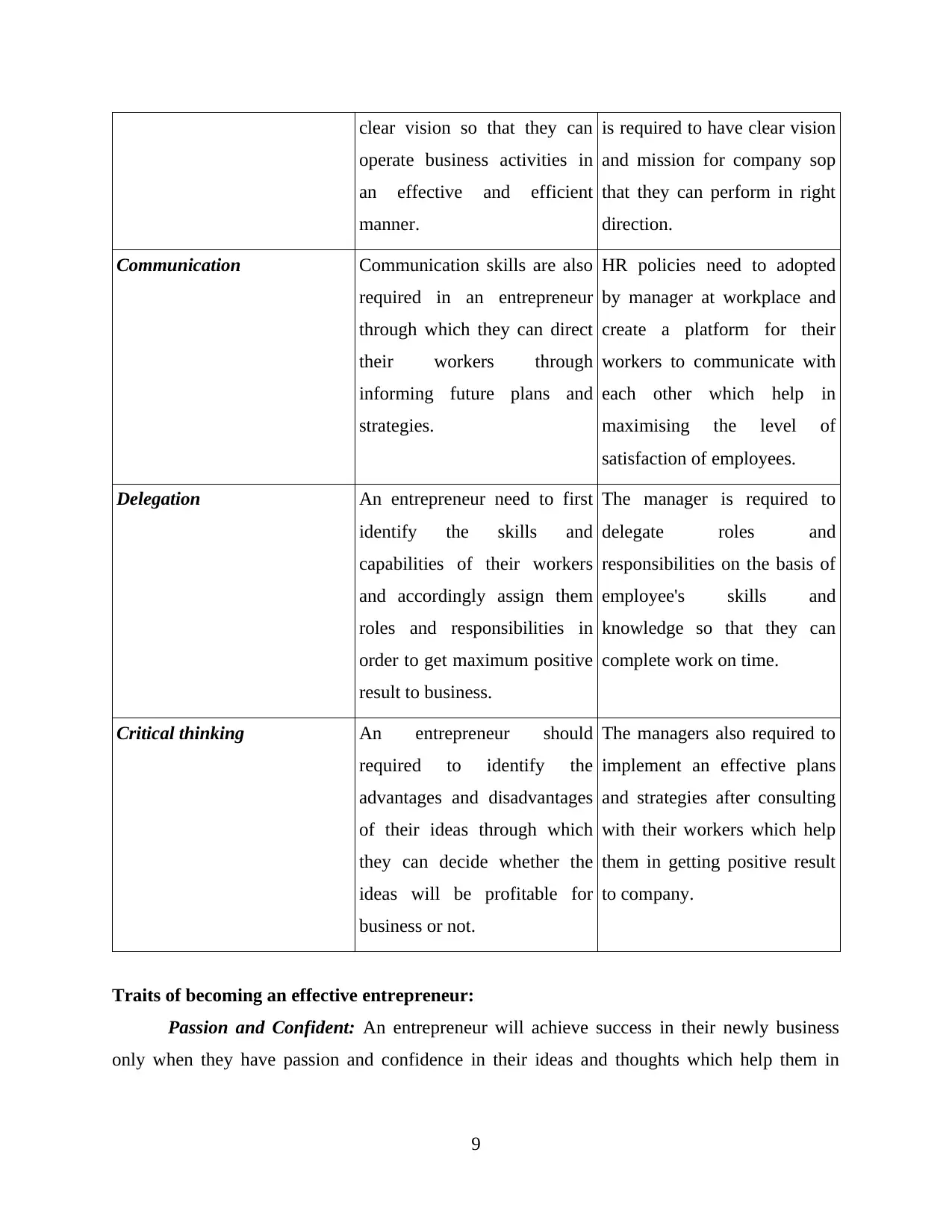
clear vision so that they can
operate business activities in
an effective and efficient
manner.
is required to have clear vision
and mission for company sop
that they can perform in right
direction.
Communication Communication skills are also
required in an entrepreneur
through which they can direct
their workers through
informing future plans and
strategies.
HR policies need to adopted
by manager at workplace and
create a platform for their
workers to communicate with
each other which help in
maximising the level of
satisfaction of employees.
Delegation An entrepreneur need to first
identify the skills and
capabilities of their workers
and accordingly assign them
roles and responsibilities in
order to get maximum positive
result to business.
The manager is required to
delegate roles and
responsibilities on the basis of
employee's skills and
knowledge so that they can
complete work on time.
Critical thinking An entrepreneur should
required to identify the
advantages and disadvantages
of their ideas through which
they can decide whether the
ideas will be profitable for
business or not.
The managers also required to
implement an effective plans
and strategies after consulting
with their workers which help
them in getting positive result
to company.
Traits of becoming an effective entrepreneur:
Passion and Confident: An entrepreneur will achieve success in their newly business
only when they have passion and confidence in their ideas and thoughts which help them in
9
operate business activities in
an effective and efficient
manner.
is required to have clear vision
and mission for company sop
that they can perform in right
direction.
Communication Communication skills are also
required in an entrepreneur
through which they can direct
their workers through
informing future plans and
strategies.
HR policies need to adopted
by manager at workplace and
create a platform for their
workers to communicate with
each other which help in
maximising the level of
satisfaction of employees.
Delegation An entrepreneur need to first
identify the skills and
capabilities of their workers
and accordingly assign them
roles and responsibilities in
order to get maximum positive
result to business.
The manager is required to
delegate roles and
responsibilities on the basis of
employee's skills and
knowledge so that they can
complete work on time.
Critical thinking An entrepreneur should
required to identify the
advantages and disadvantages
of their ideas through which
they can decide whether the
ideas will be profitable for
business or not.
The managers also required to
implement an effective plans
and strategies after consulting
with their workers which help
them in getting positive result
to company.
Traits of becoming an effective entrepreneur:
Passion and Confident: An entrepreneur will achieve success in their newly business
only when they have passion and confidence in their ideas and thoughts which help them in
9
⊘ This is a preview!⊘
Do you want full access?
Subscribe today to unlock all pages.

Trusted by 1+ million students worldwide
1 out of 17
Related Documents
Your All-in-One AI-Powered Toolkit for Academic Success.
+13062052269
info@desklib.com
Available 24*7 on WhatsApp / Email
![[object Object]](/_next/static/media/star-bottom.7253800d.svg)
Unlock your academic potential
Copyright © 2020–2026 A2Z Services. All Rights Reserved. Developed and managed by ZUCOL.





